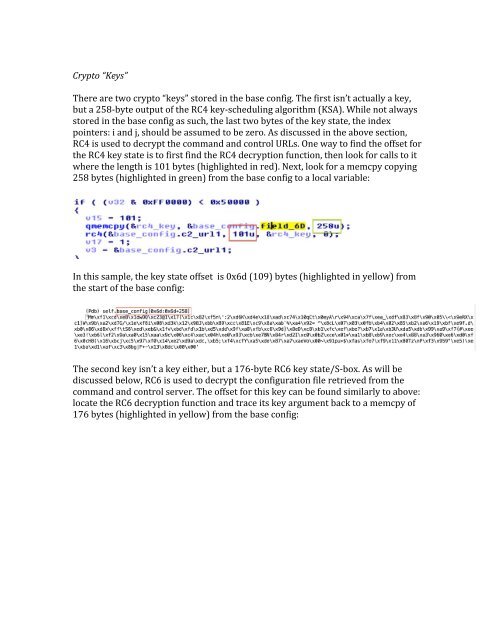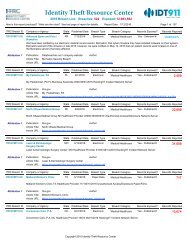ZeusVM Bits and Pieces Naming Versions
ZeusVM_Bits_and_Pieces
ZeusVM_Bits_and_Pieces
You also want an ePaper? Increase the reach of your titles
YUMPU automatically turns print PDFs into web optimized ePapers that Google loves.
Crypto “Keys” <br />
There are two crypto “keys” stored in the base config. The first isn’t actually a key, <br />
but a 258-‐byte output of the RC4 key-‐scheduling algorithm (KSA). While not always <br />
stored in the base config as such, the last two bytes of the key state, the index <br />
pointers: i <strong>and</strong> j, should be assumed to be zero. As discussed in the above section, <br />
RC4 is used to decrypt the comm<strong>and</strong> <strong>and</strong> control URLs. One way to find the offset for <br />
the RC4 key state is to first find the RC4 decryption function, then look for calls to it <br />
where the length is 101 bytes (highlighted in red). Next, look for a memcpy copying <br />
258 bytes (highlighted in green) from the base config to a local variable: <br />
In this sample, the key state offset is 0x6d (109) bytes (highlighted in yellow) from <br />
the start of the base config: <br />
The second key isn’t a key either, but a 176-‐byte RC6 key state/S-‐box. As will be <br />
discussed below, RC6 is used to decrypt the configuration file retrieved from the <br />
comm<strong>and</strong> <strong>and</strong> control server. The offset for this key can be found similarly to above: <br />
locate the RC6 decryption function <strong>and</strong> trace its key argument back to a memcpy of <br />
176 bytes (highlighted in yellow) from the base config:





